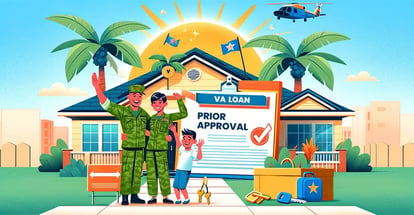How to Get VA Loan Approval For A Condo
If you’re planning to buy a condo with a VA loan, you’ll face one big hurdle before you can close on the deal – getting VA loan approval for a condo. The Department of VA has its own set of rules and guidelines for approving VA loans, including specific requirements related to townhomes or condominiums you might want to purchase with your VA loan.
You may have heard that getting VA loan approval can be difficult, especially if you’re used to the typical home buying process. However, it’s much easier with the right information than you think.
To clear things up, here’s an overview of what you need to know about VA Condo Approval and what to expect throughout the approval process.
The Basics of VA Condo Approval
Before purchasing a condo with VA financing, you should comprehend the approval process and what steps you need to take to ensure that you get approved.
Although all loan programs differ, VA loans, in general, are easier to obtain than conventional mortgages since your lender doesn’t require as much documentation or proof of income as they would with other types of loans.
The following list outlines the basics of what’s included in the VA Condo Approval Process:
-
Servicing all the 50 States, including DC, US Virgin Islands, and Puerto Rico
-
Full initial eligibility assessment for VA condo approval
-
A thorough review of essential documents
-
Financials Analysis
-
Timely VA approval submission
-
Maintaining contact with the Veteran Affairs throughout the approval process
- A thorough assistance program on denied VA approval
You must meet certain VA condo approval requirements and get VA condo approval before reaching the home financing benefit. Whether you’re looking to buy your first condo or your ninth, it’s important to understand the approval process to avoid being surprised by anything when it comes time to close your new home purchase.
Below are the basics of VA condo approval you should understand before starting your application process:
VA Condo Approval is Different from FHA
Many prospective homeowners are surprised to learn that FHA approval is separate from VA Condos. This is due to a difference in policies and requirements between these two mortgage giants. The federal government has placed restrictions on some FHA lenders, making it impossible to offer FHA loans on certain properties.
The approval process is different for FHA and VA condo approval, especially when it comes to credit history. You must know what you’re getting into before applying for a condo in one of these programs, as each has unique pros and cons.
If you’re seeking a condo in an area where either program is available, find out which type your lender prefers so you can make an informed decision about your application.
How Long Does it Take for VA Condo Approval?
The Department of Veterans Affairs (VA) has a reputation for being one of the best lenders in the country, but with complex approval guidelines. It's true that VA mortgage regulations are stringent and can be challenging, but it also takes time for them to approve a condo.
This process typically requires several weeks for approval. However, after submitting your application, additional steps can add anywhere from several days to weeks to that time frame. It depends on whether or not any issues come up during the review that may cause additional delays.
The average approval time for a VA condo loan can range anywhere from 15-30 days, but your lender can give you a better estimation based on your credit and financial information. Be sure to provide all documents required by your lender to get approved promptly.
After approval, it takes 10-20 days to close. It's important to note that some factors may add time to your acceptance and closing period, even if you have no problems with your case.
The Cost for VA Condo Approval
Before you even get started with your condo proposal, it’s important to know that there are costs involved. The exact fees will vary based on your situation, but don’t be surprised if you have to pay a few hundred dollars.
You will first have to submit all your necessary documents for review. However, it's not quite costly, even if you have to pay for a professional certified VA appraiser and legal services.
You also need to pay filing fees and fees charged by third-party agencies. Generally, the cost for approving a condo project is $895. It doesn't matter how many units are in your building.
And if you plan on applying for another condo in the future, there's no discount on reapplication fees because they're considered new applications. Don't hesitate to contact your lender to discuss any details on your specific plans or a quote for any additional required work.
VA Condo Approval is Lifetime
One of the biggest misconceptions about VA home loan approval is that it expires after 12 months. This is not true. If you are approved for a VA loan, you are approved for life.
When you get a guarantee (or Certificate of Eligibility), that's it. There is no expiration date or time limit on your approval status, so there’s no need to redo your approval after a certain period.
In some instances, however, it might be necessary to reapply for approval, but only when there is a change in circumstances that could affect your ability to use your property adequately. Such changes include marriage or divorce and an increase or decrease in income.
What Kind of Properties Need VA Condo Approval?
It will be considered unapproved if a condominium is not on VA’s Approved Condo List. This means all condos, including the site condos that aren’t currently by the VA, must undergo approval. It’s important to know what properties need VA condo approval and which don’t.
Generally, two main factors determine if a property needs VA condo approval, including the age of the building and how the housing is structured. Both issues can significantly impact how much it costs to buy or sell your condo, so they should always be considered before making any real estate decisions.
How to Check Your VA Condo Approval Status
The VA doesn't keep track of condos and townhomes it has approved in the past. So, if you’re considering purchasing one, it’s up to you to learn how to check the VA condo approval status and determine whether it has been approved per the VA guidelines.
The easiest way to do this is by using the VA loan guaranty website or contacting the building management office or condo association directly to ask them what they know about their condo’s approval status.
You can also talk to previous residents who may have stayed there while it was still being built and get their take on whether or not the VA has approved it.
HOA Documents are Required
Many lenders also require that potential borrowers provide them with a copy of their Homeowners Association (HOA) governing documents.
This is generally a formal agreement among owners that spells out how you’ll pay for maintenance, repairs, and other issues), the rules you must follow to maintain your HOA status, and additional details about how your HOA will operate.
As with bank or FHA approvals, ensure all documents are up-to-date when approaching the VA approval process. These are usually readily available through your community’s website, but they must be complete and accurate.

Documents You'll Need to Apply for VA Condo Approval
Approval of Veterans Affairs (VA) loans for a condo can be lengthy, making it tricky to keep track of essential documents you need to submit as you go through the process. Your loan will be approved by completing the necessary paperwork, and your purchase will go ahead without delay or fuss.
A good real estate attorney should be able to help you assemble these documents quickly and easily. Read on to find out what documents you'll need to complete your VA condo approval application.
Declaration of Covenants, Master Deed, or Conditions and Restrictions (CC&Rs)
The Declaration of Covenants, Conditions, and Restrictions (CC&Rs), or Master Deed, is a legal document that outlines how you can use your property. A developer or homeowners association creates it, but it also affects buyers. Your CC&Rs will impact you as a buyer by what you can and cannot do with your new property.
Generally, this document outlines all restrictions that apply to homeowners in your community. This includes everything from basic things like how many pets you can have, whether you can park a boat in your driveway, or what color you can paint your house.
The declaration is essentially your constitution for life as a homeowner at a given property. For buyers and renters alike, it's one of those documents you should always check out before signing any paperwork.
Signed Bylaws for HOA
HOA bylaws are a group of rules that govern how your condo will operate. These laws define everything from what color you can paint your front door to whether or not it’s acceptable to own chickens in your building. Additionally, HOA bylaws have a lot of say over what information you share with your neighbors.
It’s a good idea to review your HOA bylaws before moving in. Learn what you need from your seller or HOA before finalizing your purchase or signing a lease. For example, find out if you’ll need to replace carpeting with wood floors or how noise complaints are handled within an HOA.
Once in place, it’s extremely difficult and costly to change existing rules. Go over these documents carefully and make sure they meet your expectations before signing and submitting them for VA approval for a condo purchase.
Reports of Incorporation for HOA
Articles of incorporation are issued by a state’s secretary of state. They’re required to be submitted with most applications for condominium approval, and they give an overview of your planned community.
The articles should include information about how you plan to use money collected from dues and detail how you intend to administer your community’s board and finances.
HOA Budget
The neighborhood association, or Home-Owners Association (HOA), charges a fee based on common expenses shared by all residents in a community.
Most HOAs charge monthly dues of $25-100 per household to maintain landscaping, common areas, and other communal responsibilities. Monthly dues are payable in full every month or can be paid in parts with an option to pay it off over time.
An important step toward purchasing a condo or townhouse is submitting all essential HOA budget documents to get your prospective VA loan approval.
Before submitting the copies during your VA loan approval process, understand the budget, what your monthly fees cover, and how they're determined.
Current Financial Statements
You must submit your current financial statements, including the income statement and balance sheet. These two documents show how your finances have changed over time.
In addition, it includes information on non-monthly expenses like insurance or retirement accounts. These statements can be used as part of a loan application or when working on VA condo approval.
The lender will need a copy of your current income statement and balance sheet highlighting how much money you made and how much you owe after all monthly expenses are accounted for.
A certified public accountant (CPA) should prepare these essential documents and reflect your business’ finances over at least one year. The more current, complete, and accurate it is, the easier it will be for you to secure capital from the Department of Veteran Affairs.
Minutes of Last Two HOA Meetings
Minutes from past HOA meetings offer an in-depth look at your potential HOA's operations and are useful when applying for VA loan approval for a condo. This can include meeting minutes from the Board of Directors or any scheduled meetings concerning building maintenance, repairs, rules, etc.
Be sure to review them thoroughly before presenting them—they may reveal crucial information, such as additional documents that must be attached.
In addition, minutes give you an idea of what issues have been discussed in the past. Remember that minutes aren't always available, so it's smart to include a letter explaining why they aren't if they aren't provided.
Recorded Amendments for Annexation
An amendment is a change in a condo's declaration, bylaws, or rules that affects all unit owners. The amendment aims to update the condo's practices and partitions and adjust them if necessary. Amendments are voted on at all unit owners' regular or special meetings.
The proceedings usually include a public hearing, during which public members can voice their opinions on and experiences with a given property. Typically, amendments require approval from more than half of all unit owners.
If any exceptions apply, they’ll be noted in a declaration called the recorded amendment for annexation. These amendments must be submitted in writing and accompanied by several documents, including maps showing any proposed changes to boundaries and signatures from all owners who have signed any new or expanding proposals.
Plat Map or Air Lot Survey
Before getting a condo approved, you must submit a plat map or an air lot survey showing your property, location, and proximity to other buildings.
This isn’t an ordinary map – it will show all condo units on a particular size of land and other structures on your lot, including those that have been torn or burned down. The document displays the property’s dimensions, ownership, water, sewage easements, and area restrictions (if applicable).
Condominium Plans
These plans show how your condo will be built and what each unit will look like when completed. The plans also include architectural drawings, floor plans, elevations, electrical layouts, and other items required by your community's architectural review board.
The programs should also address any common areas and restrictions on use.
Common Rejections for VA Condo Approval
When buying a condo, it’s not uncommon to be rejected when getting approval from the Veteran Affairs. However, if you know what to look out for, you can avoid running into some of the most common rejections and get your approval. Here are the most common reasons why you might get rejected.
When Condominiums Do Not Meet VA Rental Restrictions
Some condos are exempt from rent-restriction guidelines imposed by some housing authorities and can therefore be less than ideal options for individuals who qualify for VA benefits. Before signing on that dotted line, make sure the subject condo meets VA’s rental restrictions.
If these restrictions are not met, you may have difficulty getting approval from your lender and have to return to square one of finding an approved property. If there's any doubt about whether or not a property will pass muster with VA, contact your lender to find out what it takes to get approved.
Strict Leasing Policies
Leasing restrictions are a common issue plaguing many VA condo applicants who seek approval from the Veteran's Administration to purchase their condominium unit within a multifamily community. Below are two main reasons strict leasing policies are an issue for VA loan approval:
-
An active-duty military member must be able to lease their unit without hindrance from the HOA.
- If the bank offering you the VA insured loan assumes the condo due to a loan default, the Department of Veteran Affairs will want to lease the property to protect their investment.
It’s essential to carefully check your prospective condo association’s leasing policy before applying to see if it qualifies. Opting for a building with lenient leasing policies will ensure your condo approval goes smoothly and stress-free. The leasing restrictions must comply with the following:
-
The HOA must authorize leasing in the neighborhood.
- There should be no Seasoning Clauses. Seasoning clauses are meant to discourage flipping. It's a term used when an investor buys a property to turn around and resell it quickly. Seasoning periods start after purchase and last anywhere from three months to one year, giving you time to prove you're living in your condo.
Bottom Line
If you’re in the market to buy a condo but not sure if you’ll qualify for a VA loan, you’re not alone. Purchasing real estate can be tricky, especially if it’s your first time doing so.
One of the most common questions in this situation is how to get VA loan approval for a condo since condos fall under different rules than typical homes do.
So it's essential to understand the entire approval process to ensure you have all the information necessary to let you feel confident with your decision moving forward.
With over 50 years of mortgage industry experience, we are here to help you achieve the American dream of owning a home. We strive to provide the best education before, during, and after you buy a home. Our advice is based on experience with Phil Ganz and Team closing over One billion dollars and helping countless families.

About Author - Phil Ganz
Phil Ganz has over 20+ years of experience in the residential financing space. With over a billion dollars of funded loans, Phil helps homebuyers configure the perfect mortgage plan. Whether it's your first home, a complex multiple-property purchase, or anything in between, Phil has the experience to help you achieve your goals.


 By
By  Edited by
Edited by 






